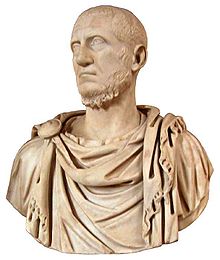Tacitus (emperor)
| Tacitus | |||||
|---|---|---|---|---|---|
 Bust of the Emperor Tacitus | |||||
| 45th Emperor of the Roman Empire | |||||
| Reign | September 25, 275 – June 276 | ||||
| Predecessor | Aurelian | ||||
| Successor | Florianus | ||||
| Born | c. 200 Interamna, Italia | ||||
| Died | June 276 (aged 76) Antoniana Colonia Tyana, Cappadocia | ||||
| |||||
Tacitus (/ˈtæs[invalid input: 'ɨ']təs/; Latin: Marcus Claudius Tacitus Augustus;[1][2] c. 200 – June 276), was Roman Emperor from 275 to 276. During his short reign he campaigned against the Goths and the Heruli, for which he received the title Gothicus Maximus.
Early life

Tacitus was born in Interamna (Terni), in Italia.[3] He circulated copies of the historian Gaius Cornelius Tacitus' work, which was barely read at the time, and so we perhaps have him to thank for the partial survival of Tacitus' work; however, modern historiography[4] rejects his claimed descent from the historian as a fabrication. In the course of his long life he discharged the duties of various civil offices, including that of consul in 273, with universal respect.[5]
Emperor
After the assassination of Aurelian, Tacitus was chosen by the Senate to succeed him, and the choice was cordially ratified by the army.[2] This was the last time the Senate elected a Roman Emperor. There was an interregnum between Aurelian and Tacitus, and there is substantial evidence that Aurelian's wife, Ulpia Severina, ruled in her own right before the election of Tacitus.[6][7] At any rate, Tacitus was situated at Campania when he heard the news of his election, and he quickly rushed to Rome.[8] He decided to re-involve the Senate in some consultative manner in the mechanisms of government[9] and asked the Senate to deify Aurelian, before arresting and executing Aurelian's murderers.[8]
Fighting barbarians
Next he moved against the barbarian mercenaries that had been gathered by Aurelian to supplement Roman forces for his Eastern campaign.[10] These mercenaries had plundered several towns in the Eastern Roman provinces after Aurelian had been murdered and the campaign cancelled.[9] His half-brother, the Praetorian Prefect Florianus, and Tacitus himself won a victory against these tribes, among which were the Heruli, gaining the emperor the title Gothicus Maximus.[8]
Death
On his way back to the west to deal with a Frankish and Alamannic invasion of Gaul, according to Aurelius Victor, Eutropius and the Historia Augusta, Tacitus died of fever at Tyana in Cappadocia in June 276.[11][12] It was reported that he began acting strangely, declaring that he would alter the names of the months to honor himself, before succumbing to a fever.[10] In a contrary account, Zosimus claims he was assassinated, after appointing one of his relatives to an important command in Syria.[13]
In popular culture
He appears in Harry Sidebottom's historical fiction novel series Warrior Of Rome.
Sources
Primary sources
- Historia Augusta, Vita Taciti, English version of Historia Augusta
- Eutropius, Breviarium ab urbe condita, ix. 16, English version of Breviarium ab Urbe Condita
- Aurelius Victor, "Epitome de Caesaribus", English version of Epitome de Caesaribus
- Zosimus, "Historia Nova", Historia Nova
- Joannes Zonaras, Compendium of History extract: Zonaras: Alexander Severus to Diocletian: 222–284
Secondary sources
- McMahon, Robin, "Tacitus (275–276 A.D)", De Imperatoribus Romanis
- Jones, A.H.M., Martindale, J.R. The Prosopography of the Later Roman Empire, Vol. I: AD260-395, Cambridge University Press, 1971
- Southern, Pat. The Roman Empire from Severus to Constantine, Routledge, 2001
- Canduci, Alexander (2010), Triumph & Tragedy: The Rise and Fall of Rome's Immortal Emperors, Pier 9, ISBN 978-1-74196-598-8
- Gibbon. Edward Decline & Fall of the Roman Empire (1888)
- Chisholm, Hugh, ed. (1911). . Encyclopædia Britannica (11th ed.). Cambridge University Press.
References
- ^ In Classical Latin, Tacitus' name would be inscribed as MARCVS CLAVDIVS TACITVS AVGVSTVS.
- ^ a b Jones, pg. 873
- ^ Historia Augusta, Vita Taciti, 15:1
- ^ McMahon, http://www.roman-emperors.org/tacitus.htm#N_3_
- ^ Canduci, pg. 100
- ^ Watson, Alaric (1999). Aurelian and the Third Century. London: Routledge. ISBN 0-415-07248-4.
{{cite book}}: Cite has empty unknown parameter:|coauthors=(help) - ^ Körner, Christian (December 23, 2008). "Aurelian (A.D. 270–275)". De Imperatoribus Romanis: An Online Encyclopedia of Roman Rulers and Their Families. Retrieved January 6, 2011.
- ^ a b c Southern, pg. 127
- ^ a b Gibbon, Ch. 12
- ^ a b Canduci, pg. 101
- ^ Aurelius Victor, 36:1
- ^ Historia Augusta, Vita Taciti, 13:5
- ^ Zosimus, I:63:2
Further reading
- Constantine P. Cavafy, The Complete Poems, Harcourt, Brace & World (1961), p. 201
- Alan Dugan, Poems 2, Yale University Press (1963), p. 33
